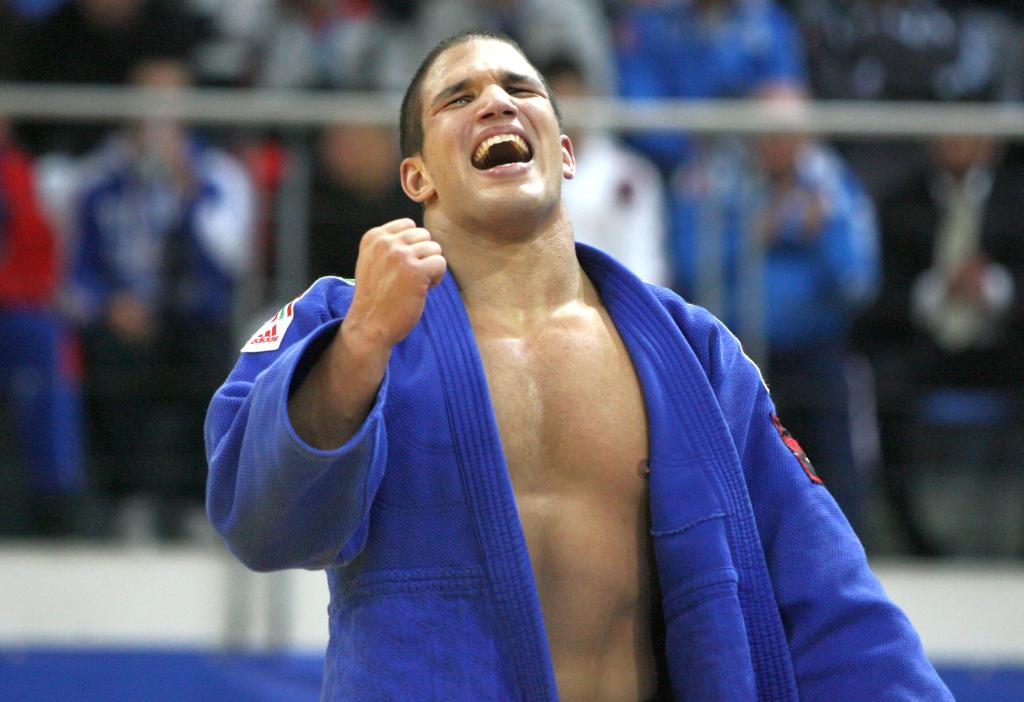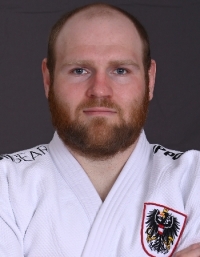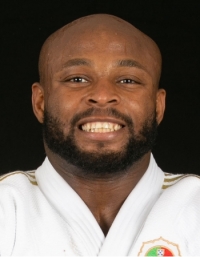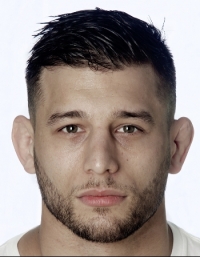The last victory of the European Championships U23 was for Russia. It gave the Russians the victory in the medal table.
A remarkable number of eleven nations have won a gold medal. At the last day Hungary, Portugal and Russia claimed the titles in the men’s division, the Ukraine and Germany in the female category. Krisztian Toth strikes in dying seconds with gold U90kg Hungary won its second gold medal and kept in line with the great results in this championship over years. Krisztian Toth claimed the gold medal U90kg and regained his gold medal of 2011 in Tyumen. Last year in Prague he finished with bronze. In the final he had a strong opponent in Aleksandar Kukolj of Serbia. Kukolj took the lead in the match by yuko and was the most offensive of the two with his taller body and strong grip. The Serbian was fifth at the European Senior Championships in Budapest this year and won a U23 European medal in 2010, also in Samokov, perhaps not a coincidence. In 2010 Kukolj lost the final U81kg of the European Junior Championships against current European Champion U81kg Avtandil Tchrikishvili. But Toth hit Kukolj twenty second for the end with a straight ippon, and took his second European title and showed a great respect for his opponent, a true gold medal for the 19-year old Hungarian. Despite his excellent fifth place at the Senior World Championships in Rio this year Toth kept the highlight of the year until 17 November. The season went with ups and downs of perhaps the biggest male talent of Hungary but the end was sweet. Russian talent Khusan Khalmurzaev had to fight for the bronze against Alexandre Iddir of France. Iddir was better than Khalmurzaev who didn’t look too focused after his loss in the semi final against Kukolj. Only in the last two minutes he gave Iddir a hard time, but the Frenchman could defend his lead and bronze medal and fourth medal for France. Italian Giuliano Loporchio won the bronze medal against Jakub Zarzeczny (POL) just a minute for the end of the match with a direct ippon. Although Zarzeczny thought he took over the throw it was the Italian who could raise his hands. It’s the fifth medal for Italy and four for the men, which is remarkable after some disappointing results this year in the senior events. Hope for Italy’s men. Anastasiya Turchyn follows up past successes U78kg The European U23 title for women U78 was reserved for Anastasiya Turchyn of the Ukraine. Turchyn stays in line with her stable career in the road to the top in this category. Turchyn scored a yuko after one-and-half minute in the final and added a second one. Her third point (waza-ari) gave a definite lead and the European title. Turchyn won her second European final. Her career started off at the Cadet European Championships in 2011 when she won the European title +70kg, followed by hopeful fifth places at the U20 and U23 Championships. Last year in Prague she lost her bronze final but today she had enough experience to win her last match of the day. The road to gold went via victories against Gergana Popova (BUL), Urska Gracner (SLO) and Guusje Steenhuis (NED) in the semi. This year Turchyn only tasted the sweet of gold in her own country, in Kiev during the Junior European Cup. Another strong Ukraine woman in this category where Anastasia Matrosova and Maryna Pryshchepa booked so many successes. Bulgaria could win another medal this event but Dutch Guusje Steenhuis prevent this massive success for the host nation. Steenhuis captured the first Dutch medal of the tournament. In a tough equal fight both judoka left their last energy for the last minute where the decision had to be made. Twenty second for the end Dzhurova received her second penalty and Steenhuis won bronze. Steenhuis defeated Ivana Marinic in the first round by ippon but Maranic recovered of this loss and came back in the repechage with a victory over Urska Gracner and won the bronze as her opponent Laia Talarn was not able to fight for the bronze due to an injury she sustained in the semi final against Tillmans. Pearl Jorge Fonseca takes gold U100kg with brilliance Jorge Fonseca added another gold winning nation to the remarkable number of 10! He received the cheers of everyone in the hall for his final point in the final against Clement Delvert of France. Perhaps the point of the tournament, but at least of the day. Fonseca is the first Portuguese man to win a European U23 title. Previously Anna Cachola (2 titles) and Telma Monteiro won the U23 title. Fonseca won four matches today starting against Luca Ardizio (ITA) and Shamil Magomedov (RUS). In the semi final Fonseca defeated Stefan Jurisic (SRB). Fonseca was born in Sao Tome and Principe, a very small African Country and came out for Portugal since 2011, a right choice. This year he won the Portuguese U23 title and medalled at two European opens. This gold medal was the best of the season and for European judo a pearl to watch. Estonian Grigori Minaskin needed only twenty seconds to grab the bronze against Stefan Jurisic of Serbia.In his last year U23 he showed his progress over years with a stable uptrend. The 2007 European Cadet Champion lost a Junior European final in 2009 and captured bronze in Samokov at the European Juniors in 2010. Today, again in Samokov, he regained memories and performed again with an excellent bronze medal. The second bronze was for Shamil Magomedov in his match against Daniel Dichev, another Bulgarian talent. Magomedov won silver at the European Championships in Samokov, also in 2010 where Dichev finished with bronze, but this time Dichev couldn’t repeat this stunt as he was penalised for leg grabbing; hansokumake. Kristin Buessow ready for seniors with second European title Germany won a gold medal by Kristin Buessow. The heavyweight was able to beat Dutch Tessie Savelkouls in the final. Germany was the eleventh nation to win a gold medal. Kristin Buessow has a strong year with victories at the European Cups in Sindelfingen and Boras but had never fought Savelkouls in such competition. For Buessow it was her last chance in this age category to medal and scored a yuko halfway the match. For Savelkouls a call for action to get back but despite the engaged support of her coach, former World Champion Monique van der Lee, the Dutch couldn’t prevent Buessow to win. Savelkouls had an good day despite a rough preparation period coming back from an injury. The 2011 junior bronze medallist was happy with silver. Buessow Gold for Germany, the eight for a woman in the history of this championship, she was already in the list of winners and is the first one to take the title twice. In 2010 she defeated last year’s European U23 champion Larisa Ceric when Buessow was 19 years young. Laura Vargas-Koch was the last German to win in 2011. In this category the lighter, more athletic judoka reached the finals. Aidana Nagorova used two minutes to defeat European Open winner Maryna Slutskaya for ippon in the bronze final. Ukrainian Galina Tarasova overcame Sandra Jablonski by ippon after two minutes ending her match in oseikomi after having scored a waza-ari. Stepan Sarkisyan gives Russia the medal victory The men’s heavyweight final was won by Stepan Sarkisyan of Russia. He was the most convincing today and made immediately clear that he wanted to gold in his final match against Daniel Allerstorfer of Austria. He scored waz-ari and yuko in the first minute and came into oseikomi not long after and took the gold. The Russian defeated Dimitri Lepp (EST) in his first match and Daniel Natea (ROU). In the semi final he could defeat Pascal Scherrenberg of The Netherlands. Tall Daniel Natea came back in the repchage and won the bronze for Romania. Within the first minute he defeated Vladimir Gajic of Slovenia. German Sven Heinle took the lead in the bronze medal match against Dutch Pascal Scherrenberg but finished the match after two minutes when he scored the final ippon. Heinle defeated Scherrenberg before and improved his fifth place of last year in Prague to a shiny bronze medal in Samokov. The victory of Sarkisyan brought Russia the victory in the medal table. With two gold medals, three silver and five bronze medals Russia was also the nation with most medals. Hungary proved again to be the benchmark when it comes to this age category. Romania was efficient with its two gold medals at day 1. Italy performed well with five medals but couldn’t take a gold medal. Winning nations per edition: 2009: 9 winning nations 2010: 9 winning nations 2011: 8 winning nations 2012: 10 winning nations 2013: 11 winning nations Next year the European Championships U23 will be held in Wroclaw, Poland. Today during the flag ceremony was handed out to the next organiser. Watch all photos in our media galleryMedia Matters












